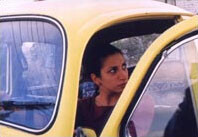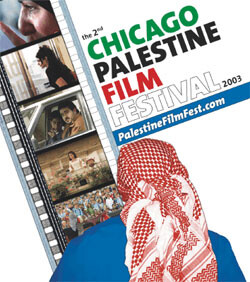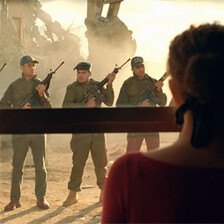The Electronic Intifada 29 April 2003

A scene from Rana’s Wedding.
Rana’s challenge is that she needs to get married by 4:00 or she has to move with her father to Egypt. Her father wrote a list of approved bachelors, but Rana has someone else in mind. Although when she does find her boyfriend, she admits to a friend that she’s scared, and it seems like she might not be ready to marry. And here’s my main criticism: if Rana is witty enough to navigate her way through military checkpoints, find her boyfriend, and arrange the proper papers needed for a wedding, couldn’t she have found another solution to the Egypt dilemma if she didn’t want to get married?
But Rana and Khalil, her theater director boyfriend, are in love and that is usually the end-all in the movie world. And they make a good match. When Rana does find Khalil sleeping in his theater, she wakes him up and tells them that they have to get married that day. Khalil doesn’t really complain. He says, “Why did I fall in love with a mad woman? Let’s get married.” It seems like he’s up for the adventure.
And Rana’s all about adventure. She sets off at daybreak, before her father wakes up, to find Khalil. She calls his cell phone, but to no avail. She knocks on several doors, but no luck. She hitches a ride in a van that blasts loud music. She runs through a stone throwing vs. bullet shooting confrontation between Palestinian boys and Israeli soldiers. She gets into a physical altercation with Israeli soldiers at another checkpoint.
Once she finds Khalil, they meet up with his friend Ranzy and try to find the town registrar so he can marry the two. What may seem like a normal task is made much more daunting when they are burdened with military checkpoints. They have to stop the car and walk to their destination once they encounter a funeral procession for a slain boy. Rana, dressed in a pink shirt, stands out against the mourners as she tries to walk in the opposite direction.
She then takes refuge in the parked car, and vents all the anger and frustration she kept bottled up inside earlier in the day. She yells and pounds her fists against the windows. There are so many things for Rana to be upset about; the martyred boy, her deceased mother not able to see her wedding, the presence of the Israeli military in her city, that it’s so hard to just get married to the one she loves.

There is much humor in this film. After waiting at Rana’s home for the registrar, who is stuck at a roadblock, they decide to meet him at the checkpoint and that is where Rana and Khalil wed. Instead of a church or a family member’s home, they get hitched inside a car. The registrar asks Khalil, “What is the dowry?” Khalil responds, in all seriousness, “One dinar.”
And so the couple exit the car, are greeted by their friends and family, and celebrate the victory of love over the challenges forced upon them by the Israeli occupation. Text narration informs the viewers that Rana and Khalil did indeed wed right at 4:00, and that “near orchards deprived by their shadows … we have hope.”
Maureen Clare Murphy is the editor of F News and lives in Chicago.



